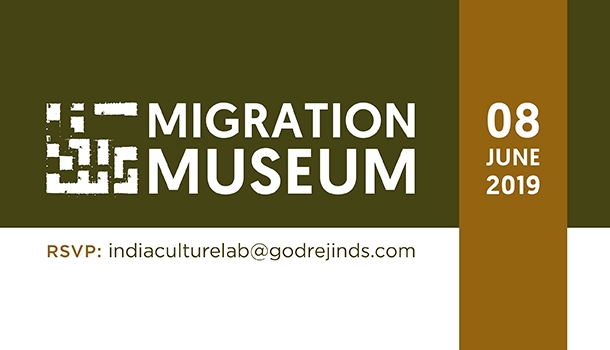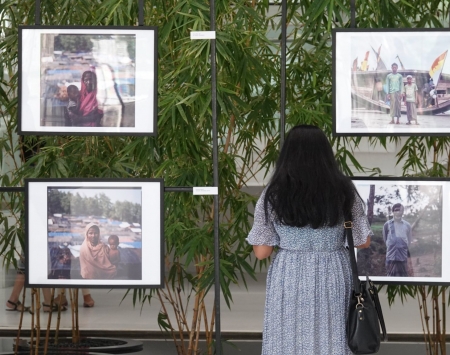We kick-started the event with the screening of Mani Kaul's Arrival which examineD migrant labour as a commodity, followed by Iftar with Rohingya Refugees by MINT which lookED at India's place in the Rohingya refugee crisis. Aajeevika Bureau's Colours of Narol was about migrant workers in the textile industry and Ghutan by the students of the Tata Institute of Social Sciences, SMCS, investigated the subject of internal migration within Mumbai as a result of infrastructural projects undertaken by the state. Priya Naresh’s Barsaati followed a midnight conversation on the streets of Delhi between two migrant men and finally, we ended with Displacement and Resilience, a film by Afra Shafiq, Khedija Lemkecher, Erika Rae Cruz, Archana Kapoor, Chandita Mukherjee and Eva Anandi Brownstein. The film explored the lives of women refugees and how they pay the price for wars and purges that leave them homeless and country-less.
Professor Chinmay Tumbe conducted a master class that traced and historicised India’s migratory patterns. Currently a faculty member at the Indian Institute of Management, Ahemdabad, he published his first book India Moving: A History of Migration in 2018.
Our panel discussion featured Dr. S. Irudaya Rajan, a Professor at the Center for Development Studies (CDS), Thiruvananthapuram, Kerala who has more than three decades of research experience at the CDS, has coordinated eight major migration surveys in Kerala and is also the editor of the annual series ‘India Migration Report’ since 2010; Vrishali Pispati, Director, Mumbai Mobile Creches (MMC), an NPO that works to provide migrant children on construction sites a safe, healthy and happy childhood and also ensures that the children move towards a brighter future through education; Sagolsem Pavel Metei, the co-founder of ‘The Chinky Homo Project’, author at InPlainspeak, TARSHI’s E-Zine and currently a consultant with Nazariya: A Queer Feminist Resource Group in Delhi; and Rupal Kulkarni, CEO, Shram Sarathi—a pioneering institute working on financial inclusion of vulnerable labour migrants in India where Rupal designs and delivers economic services that help migrant workers improve their circumstances.
Following this was a performance by poet Shalim Hussain. A writer, translator, and research scholar at the Department of English at Jamia Millia Islamia, Hussain is at the forefront of the new wave of Miyah poetry, which is a form of protest poetry by Assamese Muslims of Bengali origin.
Art at the Migration Museum was about the journey – to home, away from home or in search of it. Reena Kallat showcased her installations as book cover prints where she had created a woven map by tracing the routes of contract workers, indentured labour, asylum seekers, refugees and other migrants. The Godrej Archives shared the oral histories of the Navganis, a community that migrated in large numbers from Phadalewadi to Vikhroli to work for the company. Memesys Culture Lab’s VR exhibit SUBMERGED explored climate migration in Bihar and part two of the VR experience, Memesys’ When Borders Move delved into the complexities of national identity in Hunderman, a town fractured by war on the India-Pakistan border. The Lab prepared some dishes from Mumbai Mobile Creche’s book Food Memories of Migrant Women which is a compilation of recipes by the wives of migrant construction workers in Mumbai. Sanjay Austa had on display his series on the Siddi Goma community, the famous African descent population of Gujarat. We also exhibited Adib Chowdhury’s Letters from Arakan, which is a portrait series accompanied by written and recorded testimonials of Rohingya survivors after the Burmese military forcibly displaced them from Arakan. The NGO Aajeevika presented two of its photography features- Bade Sheher ki Chhoti Kahaniyan and Ek Ghar, Ghar se Door which capture the lives of migrant labourers in cities like Mumbai, Surat and Ahmedabad. The Lab also exhibited a part of Urbz’s Circulatory Urbanism series that highlighted how mobility fuels urban-rural circularities across towns along the coast, particularly the aspect of the ‘journey’.
Migration Museum existed ephemerally to critically analyse human flows and circularities - and explored the systems, mythologies and people that sustain them. A big thank you to all those who made this event a massive success!



